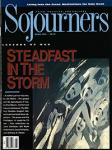Editor's Note: The fog of war and humor columns is thick with uncertainty. This column, for example, was really quite funny at press time, but may look a little dated and erroneous now. It seems you just can't count on wars being long and drawn out anymore.
We would have updated It and made it a little more ... uh ... accurate. But we couldn't. We had to spend all our time changing the rest of the magazine ...
Persian Gulf, 1995
JAN. 10: White House spokespersons announce the renaming of Operation Desert Storm to Operation Desert Quagmire.
JAN. 24: Pentagon officials again alter their estimates of Iraqi Scud missile strength after overnight attacks on Saudi Arabia, United Arab Emirates, Turkey, Pakistan, Thailand, and New Zealand. Pressed by journalists to correct previous claims that all Scuds had been destroyed, a Pentagon spokesperson replied, "I guess they had some more."
FEB. 6: Saddam Hussein announces via Jordanian radio that his forces have, to date, shot down 3,135 enemy aircraft. Reminded by an aide that enemy air forces number fewer than 2,000 planes, Hussein ordered the aide whipped and then said, "Oh."
FEB. 10: Relieved Department of Commerce officials in Washington announced that, after intense negotiations, the last American company not producing military goods had finally agreed to make the weapon of its choice. The manufacturer, which previously made school blackboards, has begun retooling to produce USO ashtrays with pictures of little Patriot missiles on the bottom.
FEB. 15: U.S. trade officials express optimism at the growing international market for America's Patriot "Scud-buster," saying they have been contacted by "a number of potential customers in Europe, Asia, and ... uh ... the Middle East."
FEB. 6: An embattled Saddam Hussein accuses the United States and the Soviet Union of secretly planning to divide post-war influence over the region, claiming their "futile attempt at Middle East hegemony will not succeed."
FEB. 7: Saddam Hussein looks up "hegemony" in the dictionary.
MARCH 12: At a morale-building troop review in Dhahran, Republican Party Chair Dan Quayle quotes Winston Churchill, saying, "Faith ... no, I mean courage, yeah, that's it, courage is the most important component of human character." He then hurriedly reboarded his jet for the flight back to Washington.
MARCH 20: Pentagon officials upgrade allied air superiority status over Iraq saying, "We now have Air Superiority Plus."
APRIL 14: A fleet of whaling ships arrived in the Gulf today, making good on Japan's long promised support of the allied military effort. Japanese leaders also increased their pledge of monetary aid by another $6 billion. This brings Japan's total pledge to more than $34 billion, which they promise to pay "very soon."
APRIL 21: Pentagon officials upgrade allied air superiority status over Iraq to "Air Sovereignty."
MAY 3: Iraqi pilots in hardened underground bunkers reportedly have been very deferential toward each other in volunteering for missions against allied forces. "No, YOU go, and I'll stay ..." "No, really, I'LL stay and YOU go ..." "No, I insist, YOU go and ..."
MAY 10: Expressing frustration with the progress of the war, Britain, France, Canada, and Syria withdraw their forces from Operation Desert Bottomless Pit. White House officials insist, however, that the international community still supports the action, citing the recent deployment of troops from Belize, Togo, Liechtenstein, and Ghana.
JUNE 11: The U.S. government announces foreign aid programs for Belize, Togo, Liechtenstein, and Ghana.
AUG. 9: Former President George Bush begins a book-signing tour promoting his just-finished autobiography: "My One Term In the White House."
OCT. 7: Claiming his exile has begun in glorious victory, Saddam Hussein flees Baghdad for his secret refuge in the West African nation of Mauritania.
OCT. 8: Scud missiles are launched from Mauritania, falling several thousand miles short of Saudi targets.
OCT. 20: In Hussein's absence, Iraqi military resolve crumbles, and victorious allied forces march into Baghdad. They are met by hordes of media representatives, but nobody else.
OCT. 24: U.S. military crews begin cleanup of rubble from civilian facilities that were not destroyed by allied bombs and missiles.
NOV. 3: With help from elated U.S. officials, Iraqis hold their first free election in 35 years.
NOV. 4: Saddam Hussein is elected president of Iraq in a landslide victory.
Ed Spivey Jr. is art director of Sojourners.

Got something to say about what you're reading? We value your feedback!